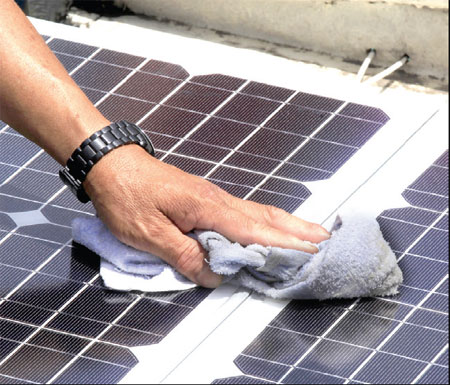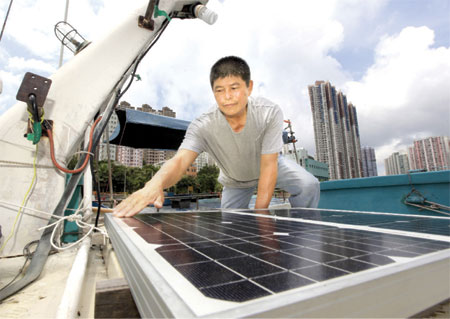Sailing with the Sun
Updated: 2011-08-12 09:22
By Kane Wu(HK Edition)
|
|||||||
|
Solar panels are fitted out to replace the dynamo that exposes fishermen to bad air. Yik Yeung-Man / for China Daily |
|
With solar panel installed on board, Cheng Fu-wai has a fresh experience of stable energy and clean air. Yik Yeung-Man / for China Daily |
|
Cheng Fu-wai works aboard his solar-powered fishing boat in Aberdeen Harbour. Yik Yeung-Man / for China Daily |

A demonstration project is just getting started, with about 200 fi shing boats already fi tted out with solar panels.The environmental initiative aims at cutting diesel fumes from the vessels and helping the city to reach its carbon emissions targets. Kane Wu reports.
Cheng Fu-wai feels the air is much fresher now aboard his 40-foot fishing boat he bought eight years ago.
"I sold the dynamo and I don't have to breathe the gases from it anymore!" says the 56-year-old fisherman. Moored in the placid waters off Aberdeen, the boat appears indistinguishable from other boats in the vicinity. But if one climbs to the top of the vessel, he will find two sets of panels. They look like chess boards, linked to the belly of the boat by wires, where the power source and batteries are located.
"These are solar panels that can charge almost every electrical device I have on the boat," Cheng tells China Daily. "The water cleaning generator, the lamps, the lights, the net knitting machine, almost everything!"
Cheng works out of Aberdeen, one of the oldest fishing villages in Hong Kong. He was given free solar equipment by the Hongkong Electric Company Ltd (HK Electric) in July. The company donated HK$1 million to install some 500 solar panels in the city, an environmental initiative to cut back on emissions from diesel engines. Some 200, 60-watt, solar panel sets have already been installed on fishing boats.
"Solar panels are not used widely among fishermen. It was the first time for some fishermen to actually learn about solar panels from the HK Electric sponsorship," says Wong For-kam, executive council member of the Hong Kong Fishermen's Association. She was closely involved with the program from its inception.
"With a few spare parts on the boats, we now consume less oil and reduce gas emissions. That is good for the environment."
"It's also good for the fishermen's health," says Professor Dennis Leung of the Department of Mechanical Engineering at the University of Hong Kong. Leung is an expert in renewable energy. "Whenever they used the dynamo and the engine, they would themselves be exposed to the bad air."
The traditional way to generate electricity on a fishing boat is to use the dynamo, which then starts the engine and burns oil. When a solar panel is being used, the engine can stand aside and there are no noise or gas emissions.
Cheng is way ahead of most his fellow fishermen in harnessing the new technology. As early as two years ago, the seasoned fisherman already had installed a small set of solar panels on his boat, on his own.
"I was visiting the mainland and noticed that some of the buildings had solar panels on the rooftops. I thought, why not try it on the boat?" Cheng recounts. So he asked a friend who worked in a solar panel manufacturing company for a set and redesigned the wires. It cost him some HK$900.
"With the solar panels, I am able to save 5-10 liters of diesel every day. That is about HK$50. Every month I can save more than HK$1,000. With less oil, the boat also weighs less and is easier to steer," Cheng says. He earns HK$10,000-HK$12,000 a month, so HK$1,000 means a lot.
Cheng was also surprised to find that solar panels can extend the life span of the batteries on the boat. "The dynamo used to heat up the batteries and make them very fragile. But with solar panels, the voltage becomes more stable, so batteries won't get so much damage during use," he explains. "I have used the current set of batteries for four years while their normal life span is two years."
The solar panels also are said to have long life. "They can survive typhoons and rain and if you don't crush the surface, they can work for some 20 years," Cheng says.
After a year of using the solar panels, Cheng started selling the idea to fellow fishermen. "At first people had doubts about it. They came up to my boat, looked at it and said, 'is it really working?' But once they started using it, they found the benefits," he says.
In a city that has about 8,200 fishermen, solar energy still is a new word. To clear the myths about alternative energy, the Turanor PlanetSolar, a ship powered entirely by solar energy, is coming to Hong Kong next week.
The multihull vessel topped by a large array of photovoltaic solar panels was constructed by Knierim Yacht Club, in Kiel, Germany. Built in 14 months, the biggest ever solar boat is touring the globe, promoting renewable energy and environmental protection. After setting out from Miami, then sailing to Cancun and Brisbane, Hong Kong is her fourth stop. The crew will hold a public exhibition and a series of conferences with leaders in solar mobility at each stop.
"There are few boats powered entirely by solar energy in Hong Kong, so this ship is going to set an example to our city," says Sam Lam, senior manager at Jiawei Solar China Co Ltd, who will speak at one of the conferences on next Wednesday, in Central.
Lam says solar technology is already quite mature and cost-effective. "It only costs a few hundred thousand dollars for a regular boat. One or two sets of solar panels can already cover most of the electricity use," he says. "People who are environment-conscious can even install them at home."
Lam works for a solar energy devices manufacturing company. He says that in recent years he has been getting more orders from property developers, who intend to install the panels on buildings. "Solar energy is a relatively clean source of energy. More use of it can solve Hong Kong's electricity over consumption," he said. "But Hong Kong still lags behind the mainland in the use of solar energy."
Lam suggests that the government make solar energy part of its long-term plan for energy and the environment. "We live in such a dense city. The demand for energy is very high. It's time we thought about renewable energy," he says.
Professor Leung agrees that solar energy can be used more widely in Hong Kong buildings but he says, "it is up to the people from the construction industry to decide".
"If you want to add solar panels to an existing building, you will have to change the structure of its outer walls completely, which is not quite cost-effective," he explains. "However they can be considered on buildings under construction."
Leung however points out that solar energy has its shortcomings.
"They are pretty much useless on rainy days. Large vehicles and ships cannot rely on them entirely for energy. They can only be an auxiliary to power engines," he says.
"I hope scientists can develop the technology better so that big boats can also drop their dynamos and engines," Cheng says.
"We have so many boats in Hong Kong. It would make the air a lot cleaner in the entire city!"
(HK Edition 08/12/2011 page4)


